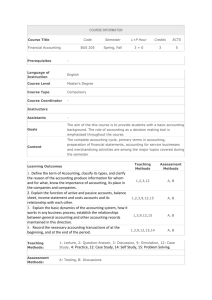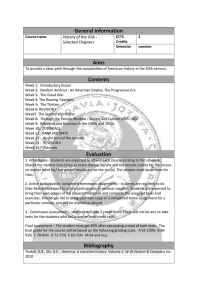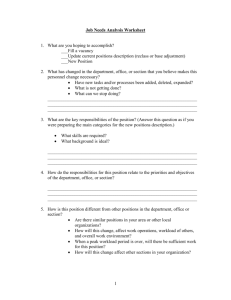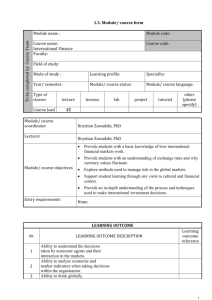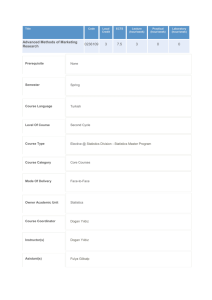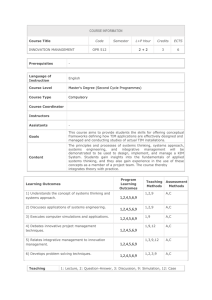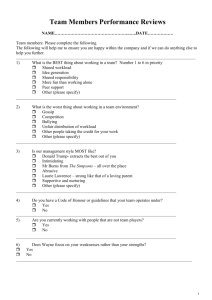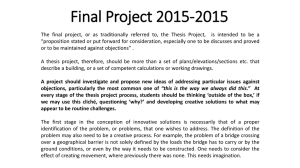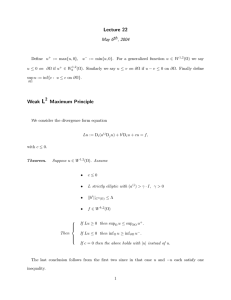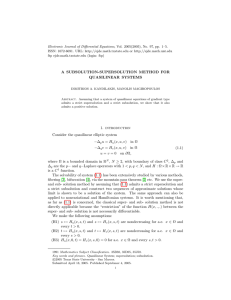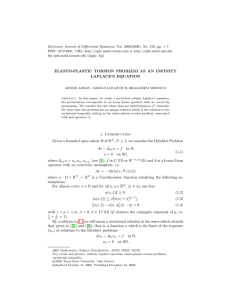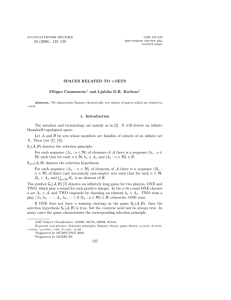Document
advertisement
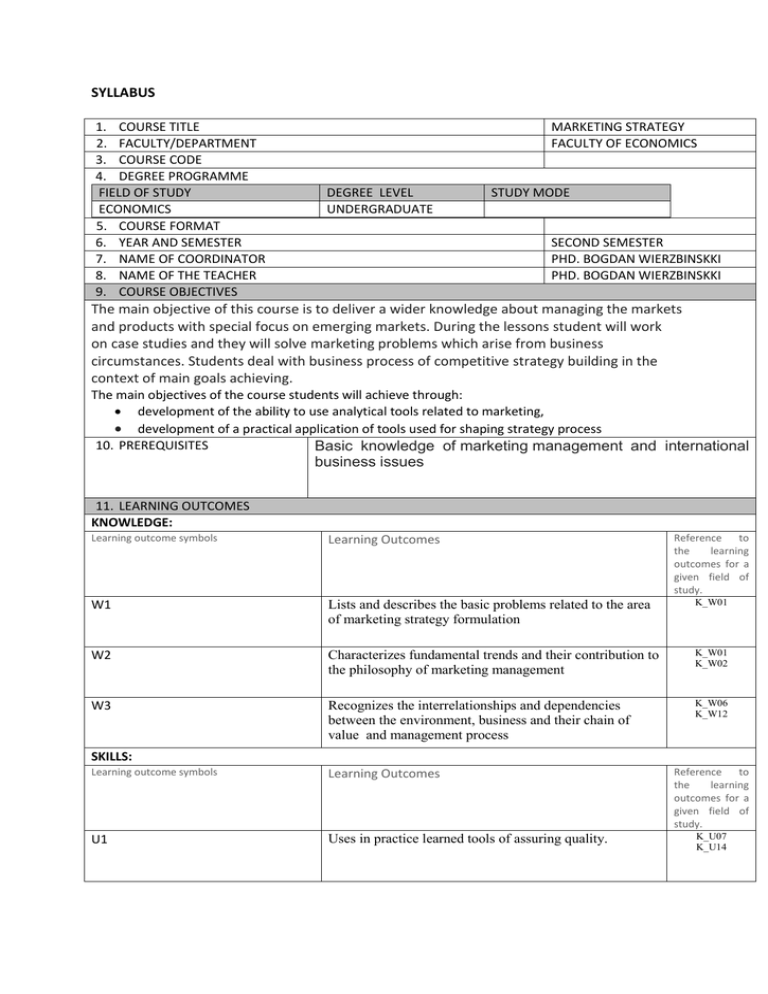
SYLLABUS 1. COURSE TITLE 2. FACULTY/DEPARTMENT 3. COURSE CODE 4. DEGREE PROGRAMME FIELD OF STUDY ECONOMICS 5. COURSE FORMAT 6. YEAR AND SEMESTER 7. NAME OF COORDINATOR 8. NAME OF THE TEACHER 9. COURSE OBJECTIVES MARKETING STRATEGY FACULTY OF ECONOMICS DEGREE LEVEL UNDERGRADUATE STUDY MODE SECOND SEMESTER PHD. BOGDAN WIERZBINSKKI PHD. BOGDAN WIERZBINSKKI The main objective of this course is to deliver a wider knowledge about managing the markets and products with special focus on emerging markets. During the lessons student will work on case studies and they will solve marketing problems which arise from business circumstances. Students deal with business process of competitive strategy building in the context of main goals achieving. The main objectives of the course students will achieve through: development of the ability to use analytical tools related to marketing, development of a practical application of tools used for shaping strategy process 10. PREREQUISITES Basic knowledge of marketing management and international business issues 11. LEARNING OUTCOMES KNOWLEDGE: Learning outcome symbols Learning Outcomes Reference to the learning outcomes for a given field of study. W1 Lists and describes the basic problems related to the area of marketing strategy formulation K_W01 W2 Characterizes fundamental trends and their contribution to the philosophy of marketing management K_W01 K_W02 W3 Recognizes the interrelationships and dependencies between the environment, business and their chain of value and management process K_W06 K_W12 SKILLS: Learning outcome symbols Learning Outcomes U1 Uses in practice learned tools of assuring quality. Reference to the learning outcomes for a given field of study. K_U07 K_U14 U2 U3 Proposed solutions to specific problems connected with the quality. K_U08 K_U12 Analyzes the effects of the proposed solutions for the whole of the organization and its environment. K_U04 K_U14 FINAL COURSE OUTPUT - SOCIAL COMPETENCES Learning outcome symbols Learning Outcomes Reference to the learning outcomes for a given field of study. K1 Understands the complex impact of marketing strategy philosophy on the overall functioning of the enterprise and the economy. K_K01 K_K04 K2 Awareness of the market need to strive for continuous improvement in all areas of socio-economic development. K_K04 K_K07 K_K09 12. COURSE ORGANISATION –LEARNING FORMAT AND NUMBER OF HOURS 13. COURSE DESCRIPTION LECTURES: The idea of the course is to familiarize students with the problems of the enterprise in a changing economic environment and the opportunities it gives for marketing activities (in the context of the plan and implementation of the strategy). Content Number of hurs 3 1. Market-led strategic management (introduction) − Marketing concept and market orientation, − Marketing fundamentals, 2. Strategic marketing planning − Marketing strategy process, − Creation of competitive position, 3 3. Portfolio analyses − Matrix approaches, 4 4. The changing market environment, − Strategies for changing environments, 2 4 5. Segmentation and positioning, − Principles of competitive positioning, TOTAL HOURS 16 TUTORIALS/SEMINARS: During the tutorials students will work on case study and discussion of issues related to the processes of management in today's highly competitive markets. Number of 4 6. International niche marketing strategies for SME enterprises, − Market entry ideas, 7. Developing and maintaining customer relationship 4 8. Collecting and analyzing marketing information − Conducting a situational analysis 2 9. Developing and leveraging competitive advantages and strategic focus, 2 2 hurs 10. Conflict and collaboration with the partners TOTAL HOURS 14. METHODS OF INSTRUCTION 15. EQUIREMENTS AND ASSESSMENTS 14 MULTI-MEDIA PRSENTATION, CASE STUDY, DISCUSSION 16. GRADING SYSTEM attendance and in-class The credit and final grade awarded at the end of the course participation (20%), essay (25%) is based on the following criteria: and final test (55%). 17. TOTAL STUDENT WORKLOAD NEEDED TO ACHIEVE EXPECTED LEARNING OUTCOMES EXPRESSED IN TIME AND ECTS CREDIT POINTS STUDENT ACTIVITY FORM STUDENT WORKLOAD PARTICIPATION IN LECTURES 16 PARTICIPATION IN TUTORIALS/ SEMINARS 14 PREPARATION FOR TURIALS (REPORT, WRITTEN WORK, PRESENTATION, ETC.) 25 ADDITIONAL CONTACT HOURS 5 TIME TO PREPARE FOR GROUP WORK 20 PREPARING FOR EXAM 18 PARTICIPATION IN EXAMINATION OR FINAL TEST 1 SUMMARY STUDENT WORKLOAD 120 TOTAL HOURS OF STUDENT WORK IN DIRECT CONTACT WITH THE TEACHER (AT LEAST 50%) 35 MODULE ECTS CREDITS 5 LANGUAGE OF INSTRUCTION 18. INTERNSHIP N.A 19. MATERIALS N.A PRIMARY OR REQUIRED BOOKS/READINGS: O. C. Ferrell, Michael D. Hartline, 2009, Marketing Strategy, McGraw-Hill (7th 1. 2. edition) Isobel Doole, Robin Lowe, 2008. International marketing strategy: analysis, development and implementation (5th edition) SUPPLEMENTAL OR OPTIONAL BOOKS/READINGS: Philip Kotler, Gary Armstrong, Veronica Wong, John Saunders. 2008, Principles of 1. marketing, Prentice Hall Podpis koordynatora przedmiotu Podpis kierownika jednostki
